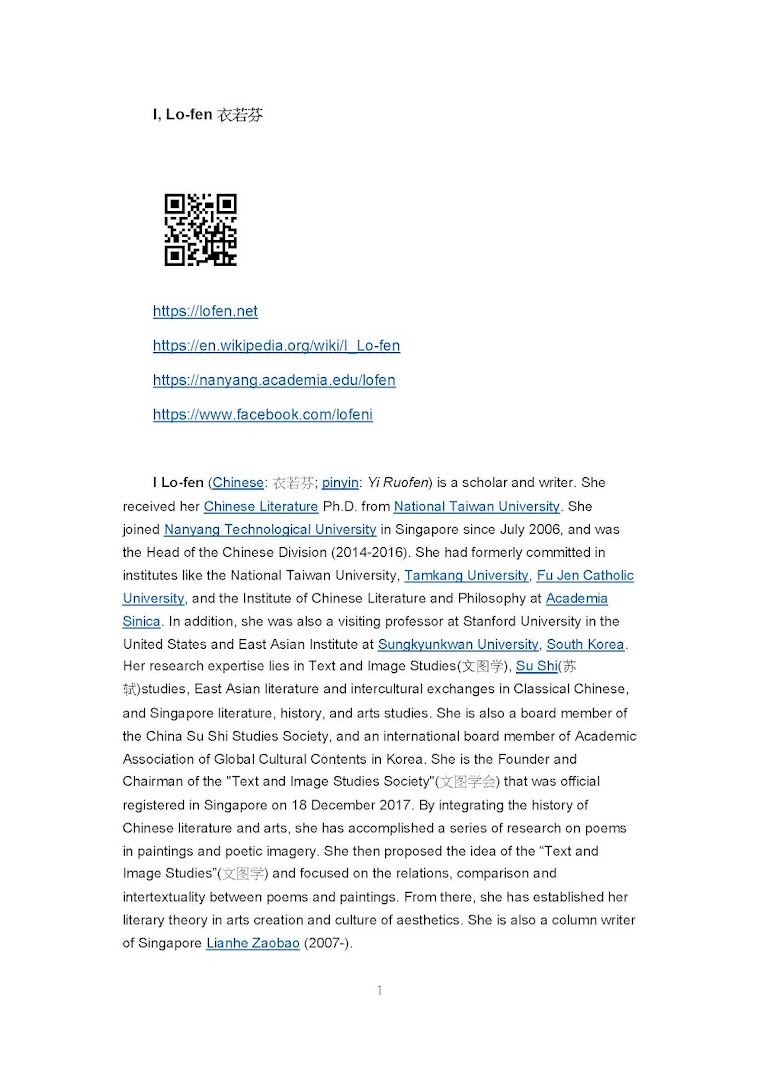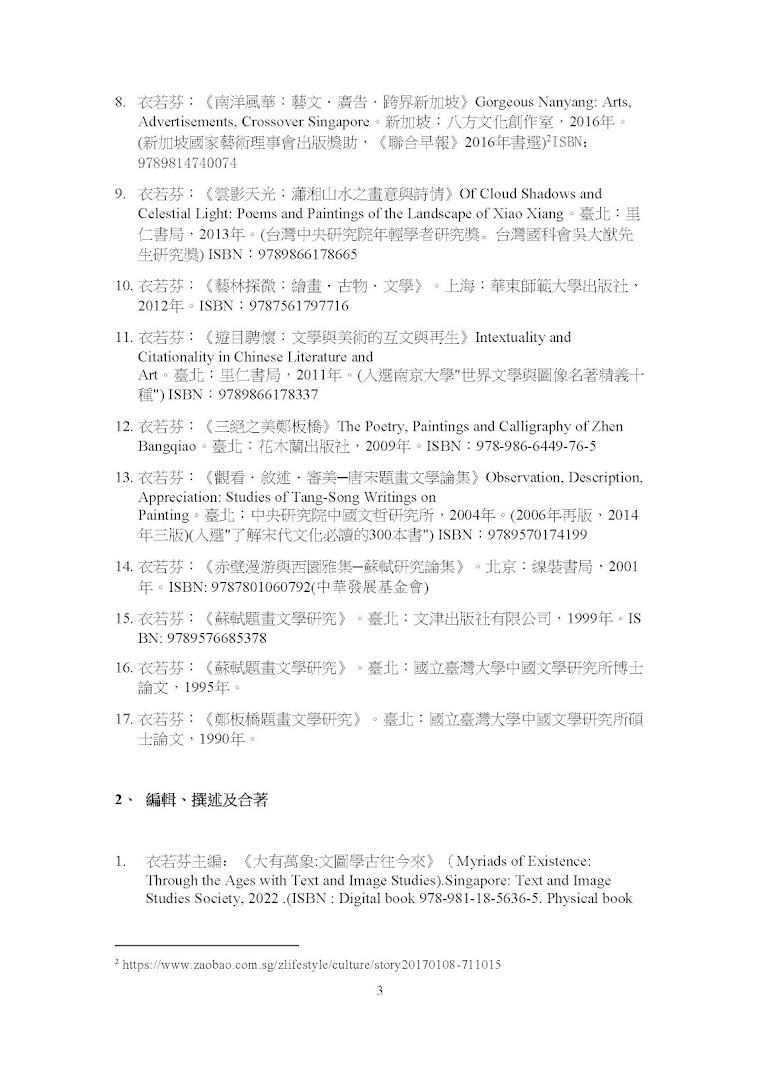2025/08/31
2025/08/30
我们还要读大学吗? Do We Still Need to Go to College?
我们还要读大学吗? Do We Still Need to Go to College?
衣若芬
你适合读大学吗?大学毕业还需要为了学历继续考研,读硕士、博士吗?
比起孔子的“十有五而志于学”,这是较为合乎当代现状,舒缓困境的建议,一个35年大学老师的经验总结。
这篇文章写给迷惘中的你,欢迎各级老师们参考指教。
***
在新加坡宽敞舒适的电影院,观赏自己中学时畅销小说改编的台湾电影修复旧片以后,全球首映,是一种怎样的心情?
已经知道新加坡电影协会主席陈继贤先生14岁时被《拒绝联考的小子》启发,不但连看了43遍,还影响一生的兴趣志业。所以亲自到新加坡出席首映场的徐进良导演动情地说:“世界的电影奖项都忘了,最重要的不是男女主角,最重要的是最佳观众!”
是的,观众,读者,我们何其有幸,能在浩瀚烟海中巧遇那提点方向的光亮!
在录取率只有30%左右的1970-1980年代,台湾的高中生如果没考上大学,还不如初中毕业就报读职业学校,习得一技之长。吴祥辉,台北市顶尖学校的高材生,毅然挑战社会的集体价值观,坚决贯彻个人不依赖学位文凭的行为,比他晚生10年的我,不仅佩服他放弃参加大学入学考试的勇气,还有他开阔的思维,走上自我掌控的道路。
老师们都担心连锁效应,要我们持续关注吴祥辉的发展。想一想,如果你也学他不考大学,会有怎样的“下场”?记得那时他从事电影工作,我有一些些羡慕,我从小写作,觉得写作人除了文字,最好还能擅长图像创意,尤其是蓬勃的影视产业。
1983年7月29日,台湾的报纸夹页刊登了录取大学新生的榜单,我的名字在第一页台湾大学中文系。苦读一个月侥幸挤进梦寐以求的窄门,在42年以后,台湾的大学甄选入学分发率超过50%,加上考试入学的管道,大学生已经在同年龄层人口中不再是稀罕的佼佼者。于是出现了“学历贬值”的说法。
维珍集团的大亨理查·布兰森(Richard
Branson)没读过大学;史蒂夫·乔布斯(Steve
Jobs)、比尔·盖茨(Bill
Gates)等人也都中途辍学;再加上近年来AI界“英雄出少年”的杰出代表,比如设计协作平台,深度集成AI设计工具Figma的创办人Dylan
Field,布朗大学休学;AI训练数据处理平台Scale
AI 创办人兼
CEO Alexandr Wang(汪滔),麻省理工学院休学, 似乎有点想法和才能的人,不必在大学浪费时间和金钱了!
何况,懂得使用AIGC(人工智能生成)工具的话,编程、文案、画图、演唱,乃至于动画影片都可以无师自通,上手比大学老师还快速顺畅。所谓的“一人公司”的创业风潮正在兴起,与其等毕业以后被选入职场社会,何不直接冲进战场,打下江山?
我曾经参考马云对于生涯规划的看法,归纳出我的阶段式成长建议:
在幼儿园时期,重点在培养热爱学习的习惯,阅读、动手操作,回应好奇心。
小学时期,重点在教育健全人格,认识我是谁,肯定自己存在的意义。
中学时期,重点在认识社会规范,区分我和他人的行为边界,涵括法律常识。
初级学院/高中时期,重点在明瞭和掌握、扩充自己的兴趣和能力,画出未来安生立命的基本蓝图。
如果就读理工学院,就要针对职场需求,训练专业技能。并非每个人都必须读大学,能够具备职业技能,而且时间和金钱都比较拮据的人,调整心态,适应环境,希望从工作中获得满足。即使不读大学,也要像儿童一样保持热爱学习的习惯,终身不休。
至于大学,应该从课程中建立系统知识结构、负责任的观念,独力或协作解决问题的方法。也就是说,除了专业技术,还要有支撑技术,可复制、迁移、迭代、优化的框架、模型、原则、理论。
假使还想深造,追求更高教育,硕士研究生是对现有/大学时形塑的知识体系加以深化、重整、巩固,思考未来的可行性。
继续拓展对世界的认知,从个案到宏观的视野,进而发现或发明思想,建构被认同的学术论述,就要攻读博士了。
那些没有读大学,没有完成学业的成功人士很了不起,但是其中是否隐含“幸存者偏差”呢?大学文凭只是进入某个圈层的入场券,有的人扫二维码;有的人—扫脸。
2025年8月30日,新加坡《联合早报》“上善若水”专栏
Do
We Still Need to Go to College?
I Lo-fen
Are You Suited for College?
Do you still need to pursue a master’s or
doctoral degree after graduating from university, just for the sake of
obtaining higher qualifications?
Compared with Confucius’ saying “At
fifteen, I set my heart upon learning,” this is advice that better fits today’s
reality and helps ease present dilemmas—an experience-based reflection from a
university teacher of 35 years.
This article is written for you, who may
be feeling lost, and I also welcome teachers at all levels to read, reflect,
and offer your guidance.
***
What kind of feeling is it to sit in a
spacious, comfortable cinema in Singapore, watching the restored version of a
Taiwanese film adapted from a bestselling novel of my secondary school days,
now having its world premiere?
I had already learned that Mr. Tan Gee
Hian, President of the Singapore Film Society, was so inspired at age 14 by The
Fellow Who Rejected College that he watched it 43 times, and it went on to
shape his lifelong passions and career. Thus, when director Hsu Chin-liang
attended the premiere in Singapore in person, he was deeply moved and said: “Forget
all the world’s film awards. The most important is not Best Actor or Best
Actress—it’s Best Audience!”
Indeed, the audience, the readers—we are
so fortunate to encounter, amid the vast ocean of existence, that glimmer of
light which points us in the right direction.
In Taiwan of the 1970s and 1980s, when the
university admission rate hovered around 30%, high school students who failed
to enter university would have been better off enrolling straight into
vocational schools after junior high, in order to master a trade. Wu
Hsiang-hui, a top student from one of Taipei’s elite schools, boldly challenged
the collective values of society, resolutely acting out a life not dependent on
degrees or diplomas. As someone ten years younger, I not only admired his
courage in giving up the college entrance exam, but also his broad-mindedness
in walking a path of self-mastery.
Teachers, worried about a chain reaction,
urged us to keep following Wu’s development. Just imagine—if you, too, refused
to go to college, what “fate” would await you? I recall that he entered the
film industry then, which I somewhat envied. Since childhood, I had been
writing, and I felt that writers, apart from words, ought also to excel in
visual creativity—especially in the flourishing film and television industry.
On July 29, 1983, Taiwan’s newspapers
carried the list of new university entrants. My name appeared on the very first
page, under National Taiwan University’s Department of Chinese. After a month
of grueling study, I had squeezed through the narrow gate of my dreams.
Forty-two years later, however, Taiwan’s university admission rate through
recommendation and selection has already exceeded 50%, and with exam-based
admissions as well, university students are no longer rare elites among their
peers. Thus arose the saying: “academic degrees are devalued.”
Richard Branson, tycoon of Virgin Group,
never went to college; Steve Jobs and Bill Gates both dropped out; in recent
years, the AI world has produced brilliant young heroes—such as Dylan Field,
founder of design collaboration platform Figma with its deeply integrated AI
design tools, who dropped out of Brown University; and Alexandr Wang, founder
and CEO of AI training data platform Scale AI, who left MIT. It would seem that
if you have ideas and talent, there is no need to waste time and money in college!
Moreover, with skill in using AIGC
(AI-generated content) tools, one can teach oneself to code, write copy, draw,
sing, and even make animated films—often faster and more smoothly than
university professors. The trend of “one-person companies” is rising. Instead
of waiting until graduation to be chosen by society, why not rush straight onto
the battlefield and carve out your own kingdom?
I once reflected on Jack Ma’s views about
career planning and summarized them into my own stage-based growth advice:
· Kindergarten
years: cultivate a love for learning—reading, hands-on
exploration, satisfying curiosity.
· Primary
school years: develop sound character—know who I am, affirm the
meaning of my existence.
· Secondary
school years: understand social norms—draw boundaries between
my behavior and others’, including basic legal awareness.
· Junior
college / high school years: clarify, expand, and strengthen my
interests and abilities—sketch the blueprint for future livelihood.
· Polytechnic
years: train professional skills tailored to workplace
needs.
Not everyone must go to university. Those
with vocational skills, or with limited time and financial resources, can
adjust their mindset, adapt to their environment, and seek fulfillment through
work. Even if you do not attend college, you should keep, like a child, the
habit of loving learning—lifelong, without pause.
As for university, its purpose should be
to build a systematic knowledge structure, a sense of responsibility, and
methods to solve problems independently or collaboratively. In other words,
beyond specialized skills, one must have the supporting frameworks—replicable,
transferable, iterative, optimizable models, principles, and theories. If one
wishes to pursue further education, a master’s degree deepens, reorganizes, and
consolidates the knowledge system formed in college, while thinking about
future feasibility. A doctoral degree, then, is to expand understanding of the
world, from case studies to a macro vision, to discover or invent ideas, and to
construct academically recognized discourse.
Those successful individuals who never
attended or finished college are remarkable—but does this not conceal a kind of
“survivorship bias”? A university diploma is merely a ticket into a certain
circle. Some scan QR codes; some—scan their faces.
August 30,
2025, Singapore Lianhe Zaobao, “Shang Shan Ruo Shui” column
2025/08/28
2025/08/18
零分的AI作业 Zero-score AI Homework
身为学生的你,用AI写作业,觉得老师看不出来吗?
作为老师的你,收到学生用AI完成的作业,会直接指出,并且给予处分吗?
2022年11月,Open AI公司发布ChatGPT 3.5,推出仅两个月,用户已经突破了
1 亿,成为史上用户增长速度最快的应用程序。在此之前,TikTok用了
9 个月;Instagram
则花了
2 年半的时间才达到1亿用户。延续我2016年起在《联合早报》专栏发表我对AI科技进展的观察,我更加认真关注AI对社会、教育、艺术,乃至人类文明的影响。
去年出版《AIGC文图学:人类3.0时代的生产力》,以及开设人工智能生成内容的课程,我便多次谈过,文字、图像、音频、视频等文本生成使用AI锐不可档,势必引发新的纠纷,促使大家正视和研讨解决问题的方案。
果然,今年我任职的大学便发生老师给三位使用AI的学生作业零分的事件。他们的作业被发现包含不存在的学术引用、错误统计数据或失效的网页链接,这些都是使用AI生成内容时常见的乱象,所谓“AI幻觉”。作业占总成绩的45%,兹事体大,学生不服,其中一位不但向校方申诉,还把资料,包括申诉书和自己的作业上传到社交平台Reddit,吸引网民议论和媒体报道。
媒体采访了涉事学生和大学发言人,透露一些细节,有的媒体自行发布新闻,声称学生获得了“平反”。到了7月18日,校方正式声明,查出其中一名被驳回的学生作业中,有
14 处非纯粹拼写的错误引用,以及虚构数据,认定是学术行为不当,最终决议维持零分处置。于是,又有媒体说这是结果“大反转”。
这次事件让我想起每次在演讲中回应听众询问敝校对学生使用AI的政策。我并非大学发言人,以下言论只梳理我从校方接收的工作通知,结合几篇我的专栏文章,加上我的经验与理解,请读者们周知。
一,南洋理工大学禁止学生使用AI吗?
2023年初,大学就向老师们表明教学方面的立场:“我们应该让学生掌握知识和技能,以道德和批判的方式有效地使用这些人工智能技术,帮助他们通过综合思想、进行深入分析和创造性地工作来提高他们的认知技能。”
二,如何规范学生使用AI工具:
1.
ChatGPT (包括其他AI工具,以下同)不能列为作者。
2.
ChatGPT 的任何使用都应在前言、研究方法、致谢词中提及。
3. 作者应该提交声明书,说明用于在论文中生成文本的任何提示,包含来自
ChatGPT 的文本的部分,以及使用
ChatGPT 产生的想法。
4. 按照大学提供的注脚范本格式注明出处和日期。
5.大学授课网页有检测作业是否由AI生成的辅助工具。
三,老师可以禁止学生使用AI工具吗?
每个科目的性质不同,老师可以衡量学习目标和成果,决定是否让学生使用。这次事件的授课老师明令学生不准许用AI于“development or generation”。我归纳撰写学术论文借用AI的情形主要有:
1.
直接生成文本。
2.
发想写作内容和框架结构。
3.
协助搜集整理参考资料和统计数据。
4.
处理注脚和引用文献格式。
5.
将内容生成可视化图像、表格和条列等。
今年1月,针对教师和学生的学术伦理规范,校方又公布了施行指南和细则,有些在校外互联网上能够公开搜寻。
新学期即将开始,我的“AIGC文图学”课不但不担心学生用AI,反而鼓励要狂用AI,让
AI素养潜移默化。
迎接通用人工智能(AGI)时代,AI已经不是“为我们工作”的工具;而是“和我们一起达成任务”的伙伴。工具可以用过即扔;伙伴可能长相左右。我们的任务是成就更理想的自己,交出满意的人生作业。
2025年8月16日,新加坡《联合早报》“上善若水”专栏
若芬按:
每次演讲AIGC文图学时,经常被问到我任教的大学如何规范学生使用AI?
这样的校园事件在社会媒体发酵,而且新加坡和中国媒体的报道不同。但是都倾向认为大学对于学生使用AI的规范不明确,这实在是很大的误解!
我不知道媒体怎么采访大学有关部门,大学的公关人员怎么处理社会舆论的声音。其实,早在2023年3月25日, 我在我的《联合早报》专栏文章《被ChatGPT发掘的国际歌手》,就谈过大学的规定。
我查阅了2023年1月以来,南洋理工大学关于教学使用AI的规定,整理成概述文章,刊登于2025年8月16日《联合早报》,望请周知。
作为全球第一位中文系出身,研究、写作、教学AIGC文图学的老师,我长期关注于人工智能生成文本,分享实验心得,推广大众认知。ChatGPT5已经公布,我们离通用人工智能更近了,希望人类趋利避害,保持谨慎的开放。
2025/08/10
《星洲创意》入选新加坡建国60年好书 Creative Nanyang: one of the best books to celebrate Singapore's 60th anniversary
感谢新加坡国家图书馆精选推荐!
我的书《星洲创意:文本.传媒.图像新加坡》(新加坡:八方文化创作室,2023年出版)入选建国60年60本好书之一。本书也荣获《联合早报》年度十大好书。
肯定和鼓励,让我们一起继续掘发这个文化大观园国家。
祝愿新加坡安定繁荣,和乐进步!
訂閱:
文章 (Atom)











